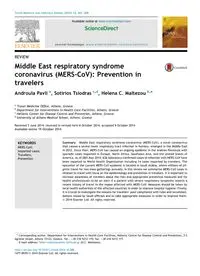
2014 Middle East respiratory syndrome coronavirus (MERS-CoV)_ Prevention in travelers PDF
Preview 2014 Middle East respiratory syndrome coronavirus (MERS-CoV)_ Prevention in travelers
REVIEW Middle East respiratory syndrome coronavirus (MERS-CoV): Prevention in travelers Androula Pavli a, Sotirios Tsiodras c,d, Helena C. Maltezou b,* a Travel Medicine Office, Athens, Greece b Department for Interventions in Health Care Facilities, Athens, Greece c Hellenic Center for Disease Control and Prevention, Athens, Greece d University of Athens Medical School, Athens, Greece Received 5 June 2014; received in revised form 6 October 2014; accepted 9 October 2014 Available online 19 October 2014 KEYWORDS MERS-CoV; Imported cases; Travelers; Prevention Summary Middle East respiratory syndrome coronavirus (MERS-CoV), a novel coronavirus that causes a severe lower respiratory tract infection in humans, emerged in the Middle East in 2012. Since then, MERS-CoV has caused an ongoing epidemic in the Arabian Peninsula with sporadic cases imported in Europe, North Africa, Southeast Asia, and the United States of America. As of 28th May 2014, 636 laboratory-confirmed cases of infection with MERS-CoV have been reported to World Health Organization including 14 cases imported by travelers. The epicenter of the current MERS-CoV epidemic is located in Saudi Arabia, where millions of pil- grims travel for two mass gatherings annually. In this review we summarize MERS-CoV cases in relation to travel with focus on the epidemiology and prevention in travelers. It is important to increase awareness of travelers about the risks and appropriate preventive measures and for health professionals to be on alert if a patient with severe respiratory symptoms reports a recent history of travel to the region affected with MERS-CoV. Measures should be taken by local health authorities of the affected countries in order to improve hospital hygiene. Finally, it is crucial to investigate the reasons for travelers’ poor compliance with rules and recommen- dations issued by Saudi officials and to take appropriate measures in order to improve them. ª 2014 Elsevier Ltd. All rights reserved. * Corresponding author. Department for Interventions in Health-Care Facilities, Hellenic Centre for Disease Control and Prevention, 3-5 Agrafon Street, Athens 15123, Greece. Tel.: þ30 210 5212 175; fax: þ30 210 5212 177. E-mail address:
